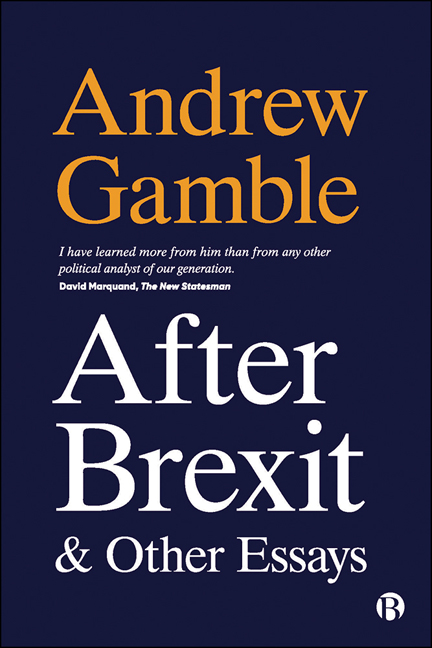Book contents
- Frontmatter
- Dedication
- Contents
- Preface
- Introduction: Historical Contexts
- Notes on the Essays
- 1 After Brexit (2019)
- 2 Explanations of British Decline (1999)
- 3 The European Disunion (2006)
- 4 The Anglo–American World View (2019)
- 5 The Free Economy and the Strong State (1979)
- 6 Thatcherism and Conservative Politics (1983)
- 7 Economic Growth and Political Dilemmas (1983)
- 8 The Crisis of Conservatism (1995)
- 9 The Thatcher Myth (2015)
- 10 Theories of British Politics (1990)
- 11 The Constitutional Revolution in the United Kingdom (2006)
- 12 What’s British about British Politics? (2016)
- Epilogue: Last Thoughts
- Notes
- Acknowledgements
- Index
6 - Thatcherism and Conservative Politics (1983)
Published online by Cambridge University Press: 22 December 2021
- Frontmatter
- Dedication
- Contents
- Preface
- Introduction: Historical Contexts
- Notes on the Essays
- 1 After Brexit (2019)
- 2 Explanations of British Decline (1999)
- 3 The European Disunion (2006)
- 4 The Anglo–American World View (2019)
- 5 The Free Economy and the Strong State (1979)
- 6 Thatcherism and Conservative Politics (1983)
- 7 Economic Growth and Political Dilemmas (1983)
- 8 The Crisis of Conservatism (1995)
- 9 The Thatcher Myth (2015)
- 10 Theories of British Politics (1990)
- 11 The Constitutional Revolution in the United Kingdom (2006)
- 12 What’s British about British Politics? (2016)
- Epilogue: Last Thoughts
- Notes
- Acknowledgements
- Index
Summary
In April 1979 the willingness of the minor parties to sustain the Labour administration finally fell away, bringing to a close another period of dispiriting and ineffectual Labour government. Labour had returned to office in 1974 in the midst of an industrial and political crisis and at the beginning of a major downturn in the world economy. It was ejected once more following the collapse of its pay policy and its devolution policy. A Labour administration had presided over a further episode in Britain's economic decline. It had attempted to mitigate the worst effects of the recession, but increasingly without any clear policy or strategy other than day-to-day survival. The control of inflation had become its chief priority, and unemployment had risen to 1.5 million. At the general election in May 1979 the Conservatives won a decisive parliamentary majority. It would have been surprising had they not done so. Since 1959 no government after serving a full term had been reelected, chiefly because no government had succeeded in interrupting the record of deepening economic failure. The Callaghan administration was certainly no exception.
In terms of votes the Conservative victory in 1979 was less impressive. The parliamentary majority of the new government was 43, but it enjoyed the support of less than half of those actually voting (44.9 per cent) and only a third of those entitled to vote. But this was a significant advance over October 1974 when only one in three voters and only one in four electors had supported the Conservatives – the lowest level of support the party had recorded at any general election this century. The revival of electoral support for the Conservatives was most marked in England, particularly in the South and in the Midlands. But the movement was not uniform. The swing of support to the Tories in Scotland and the North of England was significantly lower, and this increased still further the already marked regional bias of Conservative support. In 1955 the Conservatives had won 111 seats in Scotland and the North of England, but they only managed 78 in 1979; in the South, by contrast, the Conservatives captured 261 seats (as against 223 in 1955).
- Type
- Chapter
- Information
- After Brexit and Other Essays , pp. 113 - 132Publisher: Bristol University PressPrint publication year: 2021



